
Vegetable Waste Disposal

|
Professor Rot says:
In fact, you're a fool to not compost your food waste! What better way to return to the Earth than to recycle your food waste in your own yard! Composting food scraps at home is one of the most important aspects of home composting. Why? Because food scrap items such as vegetable and fruit waste, meal leftovers, coffee grounds, tea bags, stale bread, grains, and general refrigerator spoilage are an everyday occurrence in most households. One of the "great waves" in municipal and home recycling is the concentration on what to do with the enormous amount of food waste generated in and out of the home, by businesses, or as a result of surplus farming. On the grand scale, it is estimated that about one-half of all food that is produced or consumed in the U.S. is discarded. The main culprits are spoilage and overproduction/surplus. A typical household throws away an estimated 474 pounds of food waste each year. Put another way, that is about 1.5 lbs per person a day in the U.S. Food scraps generated by all households in the United States could be piled on a football field more than five miles (26, 400 feet) high! Up to 90 percent of waste thrown out by businesses like supermarkets and restaurants is food scraps. In fact, food scraps are the third largest segment of the waste stream with nearly 26 million tons generated each year. Of the overall wastestream, about 12% is food-related, behind paper and plastic. CHECK WITH YOUR MUNICIPAL WASTE MANAGEMENT DISTRICT TO SEE IF YOU ARE ALLOWED TO COMPOST FOOD SCRAPS AT HOME! Believe it or not, some cities have issues with the home composting of food scraps. Why? Because there is the concern over attracting rodents and other vermin (racoons, opossums, scavengers, etc.) to an inadequately secure compost bin. Therefore, a community may desire more control over food waste recycling.
WHAT HOME FOOD WASTE CAN YOU COMPOST? Not all food waste is created equal. You should know this or else you may have problems popping up in your compost bin or pile. BIG PROBLEMS! Actually, once you look at the chart below, commonsense will be your guide.
Now that you know what you can compost out of your kitchen, create a household plan. Use this plan from food preparation and storage to kitchen storage, and ultimately to the compost bin. Food Scraps at the Stove Ever wonder how those sauces or soups at your favorite restaurant are prepared? Yes, from vegetable scraps such as peels, skins, stalks, etc. Simply simmer a small pan of such scraps, as seen on the front burner in the photograph, for a few hours, let cool, then store in your refrigerator until you desire to make a soup or sauce. The stock is delicious, and you did a little vegie recycling to boot! How to Store Compostable Food Scraps Many people who have an in-sink garbage disposal don't even consider this fact: what they grind up ends up merging with the wastestream leaving their house and into the larger wastestream of their municipality. This definitely taxes municapl waste treatment facilties. Home composting is a decision to have the buck stop at your household.
The KITCHEN COMPOST PAIL
You can purchase a food scrap pail designed specifically to securely store food scraps. Look for one with a tight-fitting lid, adequate storage, aesthetic appeal, washable, and with a handle. You can also use a plastic container, such as a 1-quart yogurt container for small quantities of scraps. Empty your containers daily or every few days, depending upon how much waste you generate, or to insure that no smell starts permeating the kitchen or home. You can always cover the scraps inside a container with a wet paper towel or newspaper to cut down on odor or gnats. The FOOD SCRAP BUCKET
Pick Your Problem: ODOR? FLIES? RODENTS? The cause is always AT LEAST ONE of these:
OTHER WAYS TO COMPOST FOOD SCRAPS
|
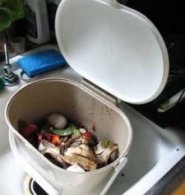
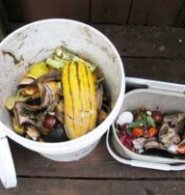
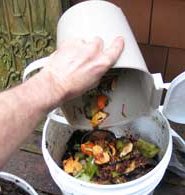
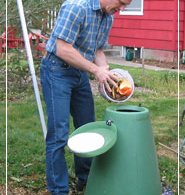

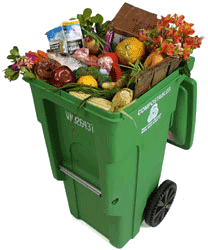 Some communities are exploring curbside
Some communities are exploring curbside 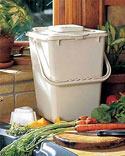 CREATE A HOME FOOD WASTE PLAN!
CREATE A HOME FOOD WASTE PLAN!
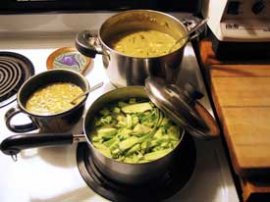 The best way to store food scraps until thrown into the compost bin is in a securely lidded Kitchen Compost Pail. This can be kept near the sink or beneath it. See photograph.
The best way to store food scraps until thrown into the compost bin is in a securely lidded Kitchen Compost Pail. This can be kept near the sink or beneath it. See photograph.














